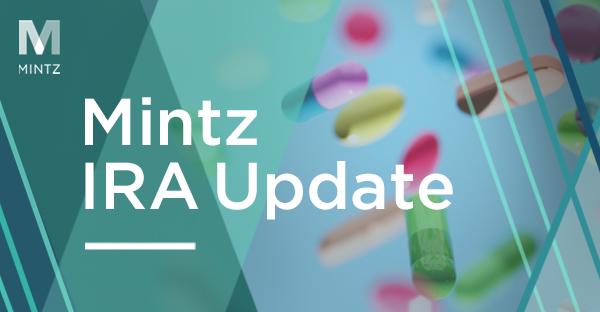
Medicare, Medicaid and Commercial Coverage & Reimbursement
Viewpoints
Filter by:
A Pivotal Week for Pharmaceutical Policy: Trump Administration Advances Tariff and Drug Pricing Initiatives
October 7, 2025 | Blog | By Theresa Carnegie, Stephnie John, Hassan Shaikh, Attiya S. Khan, Grace Callander, Sneha Shenoy
The first week of October 2025 marked a significant shift in U.S. drug pricing policy as the Trump administration unveiled a series of sweeping actions to deliver on his promise to lower drug prices. From President Trump’s announcement of a 100% tariff on imported branded drugs to the Trump administration’s landmark pricing deal with Pfizer and the rollout of the TrumpRx.gov direct-to-consumer (DTC) platform, last week marked an escalation in the White House’s efforts to drive down prescription drug costs and bring pharmaceutical manufacturing back to U.S. soil. Below, we provide an overview of the Trump administration’s new policies and the stakeholder responses already reshaping the broader pharmaceutical landscape.
Health Law Diagnosed: Mintz IRA Update — Q3 2025 Edition
September 22, 2025 | Podcast | By Bridgette Keller, Hassan Shaikh
In the latest episode of Health Law Diagnosed, Of Counsel Bridgette Keller is joined by Associate Hassan Shaikh for a discussion on noteworthy developments relating to the IRA and drug pricing.
Mintz IRA Update — Still Undefeated: Government Notches Three More Victories in Negotiation Program Lawsuits
September 15, 2025 | Article | By Theresa Carnegie, Mitchell Clough, Xavier Hardy, Hassan Shaikh
Federal courts continue to uphold the Medicare Drug Price Negotiation Program, with multiple rulings emphasizing the voluntary nature of manufacturer participation. Key legal challenges from AstraZeneca, Boehringer Ingelheim, PhRMA, and others face setbacks as the government remains undefeated.
Mintz IRA Update — IRA Medicare Drug Price Negotiation Program Updates for Q3 2025
September 15, 2025 | Article | By Rachel A. Alexander, Stephnie John, Samantha Hawkins, Hassan Shaikh
On May 12, 2025, the Centers for Medicare & Medicaid Services (CMS) issued draft guidance for the third cycle of the IRA’s Medicare Drug Price Negotiation Program (Negotiation Program).
Mintz IRA Update — Redesigning Part D for CY 2026
September 15, 2025 | Article | By Tara E. Dwyer, Samantha Hawkins
CMS finalizes 2026 Medicare Part D changes under the IRA, including new cost limits, subsidy guidance, and updated creditable coverage rules.
Mintz IRA Update — Under Pressure: The Trump Administration’s Drug Pricing Executive Orders
September 15, 2025 | Article | By Theresa Carnegie, Xavier Hardy, Hassan Shaikh, Abdie Santiago
President Trump issues executive orders and letters to curb drug costs, promote MFN pricing, and reform Medicare’s Negotiation Program.
Mintz IRA Update — 340B Roundup: States and Manufacturers Continue to Battle over 340B Contract Pharmacies
September 15, 2025 | Article | By Lauren Moldawer, Xavier Hardy, Abdie Santiago, Jordyn Flaherty
States and manufacturers clash over 340B contract pharmacy laws as litigation mounts and courts weigh in on the future of pharmacy access protections.
Mintz IRA Update — PhRMA’s 2025 Policy Agenda and the Industry’s Crossroads with the IRA and Drug Pricing Reform
September 15, 2025 | Article | By Theresa Carnegie, Hassan Shaikh
PhRMA’s 2025 agenda pushes back on drug pricing reforms, calling for innovation-friendly policies, 340B reform, and PBM accountability.
Mintz IRA Update — Medicare Part B Physician Fee Schedule Guidance and Its Potential Implications for Medicare Part D
September 15, 2025 | Article | By Theresa Carnegie, Tara E. Dwyer, Rachel Yount, Hassan Shaikh
The CY 2026 Physician Fee Schedule Proposed Rule (PFS Proposed Rule) introduces significant changes to how drug manufacturers must treat Bona Fide Service Fees (BFSFs) when calculating Average Sales Price (ASP) for Medicare Part B drugs.
Mintz IRA Update — The Uncertain State of Affairs for GLP-1s
September 15, 2025 | Article | By Theresa Carnegie, Hassan Shaikh, Samantha Hawkins
GLP-1 receptor agonists (GLP-1s) such as semaglutide, and dual agonists like tirzepatide, are transforming obesity treatment and reshaping the US health care landscape.
Mintz IRA Update — 340B Roundup: HRSA Launches 340B Rebate Model Pilot Program Amid Ongoing Legal and Regulatory Shifts
September 15, 2025 | Article | By Lauren Moldawer, Xavier Hardy, Abdie Santiago, Jordyn Flaherty
HRSA launches 340B rebate pilot tied to Medicare drug negotiations, signaling major program shifts amid legal rulings and stakeholder concerns.
Mintz IRA Update — 340B Roundup: CMS Proposes Steeper OPPS Clawbacks, Launches Drug Cost Survey with Public Comment
September 15, 2025 | Article | By Lauren Moldawer, Xavier Hardy, Abdie Santiago, Jordyn Flaherty
CMS proposes OPPS payment cuts and a drug cost survey, signaling major 340B reimbursement shifts and renewed scrutiny of hospital payment rates.
Mintz IRA Update — 340B Roundup: Senate HELP Committee’s Long-Awaited 340B Report Highlights Ongoing Problems but Provides Few Solutions
September 15, 2025 | Article | By Lauren Moldawer, Xavier Hardy, Abdie Santiago, Jordyn Flaherty
Senate HELP Committee releases 340B report urging transparency, oversight, and reforms amid uncertainty over future federal legislative action.
Mintz IRA Update — Disrupting the Pharmaceutical Supply Chain: The Era of the DTC Model
September 15, 2025 | Article | By Theresa Carnegie, Stephnie John
While the pharmaceutical industry has reacted negatively to President Trump’s May 12 “Delivering Most-Favored-Nation Prescription Drug Pricing to American Patients” Executive Order (Executive Order), manufacturers appear to be leveraging one of Trump’s directives in the Executive Order, accelerating the industry’s shift toward a new model of drug delivery: direct-to-consumer (DTC) programs.
Mintz IRA Update — Operationalizing the Medicare Prescription Payment Plan and Medicare Inflation Rebate Program
February 13, 2025 | Article | By Madison Castle
Read about clarification from CMS for Part D Sponsors implementing the IRA’s Medicare Prescription Payment Plan and Medicare Prescription Drug Inflation Rebate Program policies that took effect on January 1, 2025.
Mintz IRA Update — The IRA in 2025: The Future of Medicare Part D
February 13, 2025 | Article | By Stephnie John, Abdie Santiago
Read about the impact of changes to Medicare Part D’s Part D benefit redesign and other changes that went into effect on January 1, 2025, and additional changes to watch for in 2025.
Mintz IRA Update — The Future of the Medicare Drug Price Negotiation Program
February 13, 2025 | Article | By Samantha Hawkins, Matthew Tikhonovsky
Read about recent changes made by CMS to the Medicare Drug Price Negotiation Program following the first round of negotiations, manufacturers’ reactions to CMS’s explanations about maximum fair prices, the drugs targeted for the second round of negotiations, and the implications of the Trump administration for the future of the program.
Mintz IRA Update — A Circuit Win and the End of Chevron Deference Could Shift Tides in Drug Price Negotiation Program Challenges
February 13, 2025 | Article | By Xavier Hardy, Mitchell Clough
Read about how a win in the Fifth Circuit and the end of Chevron deference could breathe new life into the Medicare Drug Price Negotiation Program challenges despite continued losses in federal court.
Mintz IRA Update — Fourth Edition: Q1 2025
February 13, 2025 | Article | By Rachel A. Alexander, Theresa Carnegie, Tara E. Dwyer, Lauren Moldawer, Hassan Shaikh, Stephnie John, Madison Castle, Mitchell Clough, Xavier Hardy, Samantha Hawkins, Alexander Hecht, Abdie Santiago
Mintz’s Pharmacy Benefits and PBM Contracting Practice is pleased to present the ‘Fourth Edition: Q1 2025’ of our Mintz IRA Update, a regular publication that delves into developments of the Inflation Reduction Act of 2022 (IRA) and their impact on pharmaceutical supply chain stakeholders.
Mintz IRA Update — Duplicate Discounts Between the 340B Program & Medicare Drug Price Negotiation Program
February 13, 2025 | Article | By Abdie Santiago, Lauren Moldawer
This article discusses challenges related to laws prohibiting manufacturers from paying rebates on drugs dispensed to 340B eligible patients, known as nonduplication, how nonduplication is linked to implementation of the Maximum Fair Price, and stakeholder concerns with successfully navigating these new requirements.
Explore Other Viewpoints:
- Data Centers & Digital Infrastructure
- AI: The Washington Report
- Antitrust and Federal Regulation
- Appellate
- Arbitration, Mediation & Alternate Dispute Resolution
- Artificial Intelligence
- Awards
- Bankruptcy & Restructuring
- California Land Use
- Cannabis
- Class Action
- Complex Commercial Litigation
- Construction
- Consumer Product Safety
- Corporate Governance (ESG)
- Cross-Border Asset Recovery
- DEI Legal Developments
- Debt Financing
- Direct Investing (M&A)
- Diversity
- EB-5 Financing
- Education & Nonprofits
- Employment
- EnforceMintz
- Environmental (ESG)
- Environmental Enforcement Defense
- Environmental Law
- Environmental, Social, and Corporate Governance (ESG)
- FDA Regulatory
- FDA in Flux
- False Claims Act
- Federal Circuit Appeals
- Financial Institution Litigation
- Government Law
- Growth Equity
- Health Care
- Health Care Compliance, Fraud and Abuse, & Regulatory Counseling
- Health Care Enforcement & Investigations
- Health Care Transactions
- Health Information Privacy & Security
- IP Due Diligence
- IPRs & Other Post Grant Proceedings
- Immigration
- Impacts of a New US Administration
- Insolvency & Creditor Rights Litigation
- Institutional Investor Class Action Recovery
- Insurance & Financial Services
- Insurance Consulting & Risk Management
- Insurance and Reinsurance Problem-Solving & Dispute Resolution
- Intellectual Property
- Investment Funds
- Israel
- Licensing & Technology Transactions
- Life Sciences
- Litigation & Investigations
- M&A Litigation
- ML Strategies
- Managed Care
- Medicare, Medicaid and Commercial Coverage & Reimbursement
- Mergers & Acquisitions
- Patent Litigation
- Patent Prosecution & Strategic Counseling
- Pharmacy Benefits and PBM Contracting
- Portfolio Companies
- Privacy & Cybersecurity
- Private Client
- Private Equity
- Pro Bono
- Probate & Fiduciary Litigation
- Products Liability & Complex Tort
- Projects & Infrastructure
- Public Finance
- Real Estate Litigation
- Real Estate Transactions
- Real Estate, Construction & Infrastructure
- Retail & Consumer Products
- Securities & Capital Markets
- Securities Litigation
- Social (ESG)
- Special Purpose Acquisition Company (SPACs)
- Sports & Entertainment
- State Attorneys General
- Strategic IP Monetization & Licensing
- Sustainable Energy & Infrastructure
- Tax
- Technology
- Technology, Communications & Media
- Technology, Communications & Media Litigation
- Trade Secrets
- Trademark & Copyright
- Trademark Litigation
- Unified Patent Court (UPC)
- Value-Based Care
- Venture Capital & Emerging Companies
- White Collar Defense & Government Investigations
- Women's Health and Technology


